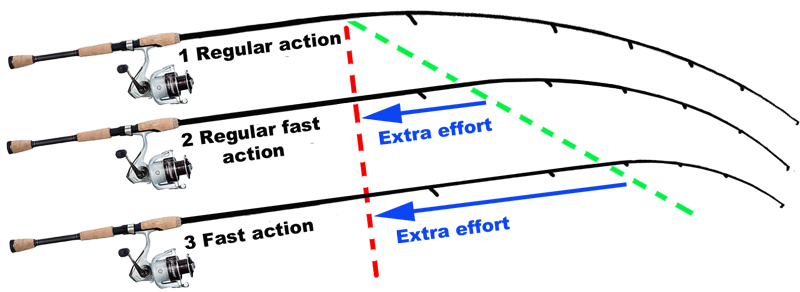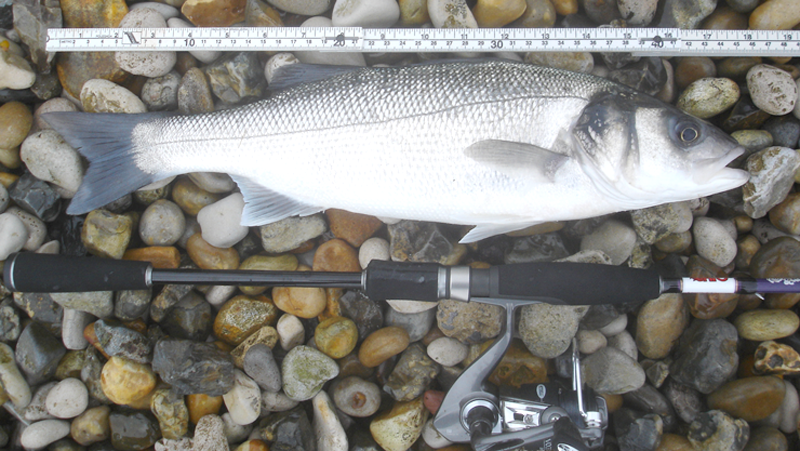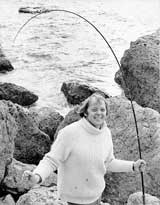rod specifications
 Lure rods built for fixed spool spinning reels have high stand off line guides that choke the line through ever-smaller guides towards the tip ring. Although designed to cast light weights, like any other fishing rod, cost is depend upon the composite materials of the rod blank and the quality of the fittings. Disregarding cost, it is important the specifications of the rod are printed on it, which should include the weight of lure the rod is designed to cast.
Lure rods built for fixed spool spinning reels have high stand off line guides that choke the line through ever-smaller guides towards the tip ring. Although designed to cast light weights, like any other fishing rod, cost is depend upon the composite materials of the rod blank and the quality of the fittings. Disregarding cost, it is important the specifications of the rod are printed on it, which should include the weight of lure the rod is designed to cast. Usually printed just above the upper grip, the specifications can be as diverse as the two I have illustrated, although both give the essential lure weight the rod is designed to cast. The difference between the lightest and heaviest lure is said to be the rods casting range.
Usually printed just above the upper grip, the specifications can be as diverse as the two I have illustrated, although both give the essential lure weight the rod is designed to cast. The difference between the lightest and heaviest lure is said to be the rods casting range. The middle of the casting range is the optimum weight the rod will cast furthest with the least physical effort. Casting lures heavier than the optimum casting weight will make the rod feel progressively more bendy or overloaded—casting lures lighter than the optimum casting weight will make the rod feel progressively stiffer, or under loaded.
The middle of the casting range is the optimum weight the rod will cast furthest with the least physical effort. Casting lures heavier than the optimum casting weight will make the rod feel progressively more bendy or overloaded—casting lures lighter than the optimum casting weight will make the rod feel progressively stiffer, or under loaded.
In the U.K., the most popular spinning rods have a casting range of 10—30g., which suits the weight of the majority of popular Bass lures.
rod action
Rod action describes both how a rod bends under load and its subsequent speed of recovery when the energy is released. Although this may sound quite simple, there is no agreed standard between manufactures.

In the graphic illustrates how the theory works using three hypothetical spinning rods, each identical in every way other than their action. Each rod is shown to be casting the same weight with equal effort.
The blue arrows under rods 2 and 3 indicate the extra effort required bend the rod to the same profile as rod 1 whilst still casting the same weight.
The additional energy loaded into rods 2 and 3 will make the rod recover much faster, theoretically propelling the lure further. In real life, disregarding wind strength and direction, other forces come into play such as what the lure is made of, its weight, size and shape.
In the UK., the most popular Bass spinning rods have a regular or regular fast action, with a casting range of around 10-30g
suitable rod length
For most aspects of shore spinning it is preferable to use the longest rod that feels comfortable to hold, bearing in mind a long rod will cast a lure further with less effort.
In the UK., the most popular spinning rods are between 274-305cm long, have a regular or regular fast action, with a casting range of around 10—30g.
Street, LRF, HRF and Dropshot
The "old school" way of describing lure rods as light, medium or heavy are now being replaced by; Street (harbour and pier angling) LRF (light rock fishing) HRF (hard rock fishing) and Dropshot.
Much more importantly, these names herald a new attitude amongst modern sea anglers who target a particular species using suitably light tackle and lures; holding the fish with a damp cloth whilst removing the hook with forceps, then releasing it to fight another day.
Fish care is particularly important to modern day bass anglers since the implementation of the 2018 EU conservation directives force leisure anglers to release every bass they land.

A HRF (Hard Rock Fishing) rod has a casting range of around 10-30g.
A LRF (Light Rock Fishing) rod has a casting range of around 3-15g.
A Street (pier or docks) rod has a casting range of around 1-10g.

A nice plump, rod bending 45cm bass taken from the quayside with my fast action HTO 230cm (7'6") long 3-12g Rockfish Revolution street rod, with my Mitchell reel loaded with 2·8kg (6lb) braid line and fluorocarbon lure trace. The lure was a number 1 Black Minnow (10g) dressed with an off shore jig head. The Bass was quickly returned after this photograph was taken—with holiday flats just metres behind me, definitely Street and definitely exciting spinning.
For more enlightenment and eye opening entertainment check out 'Street fishing UK,' LRF UK' and HRF UK' on YouTube.


